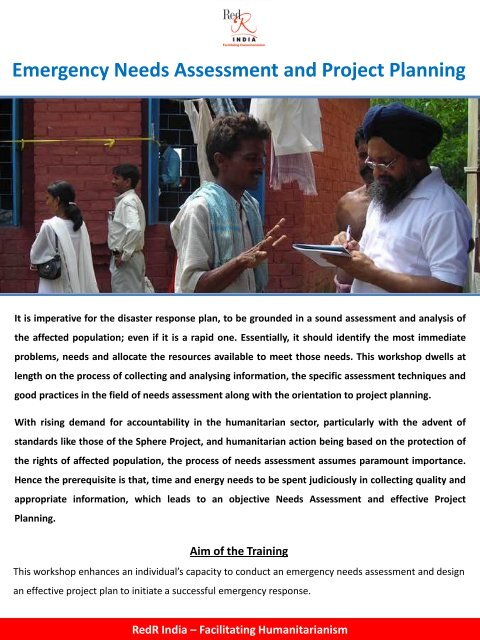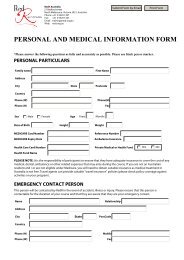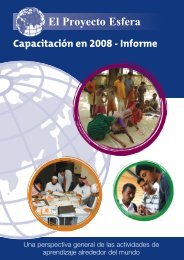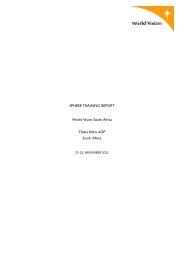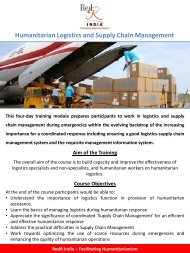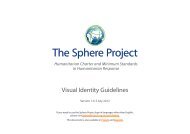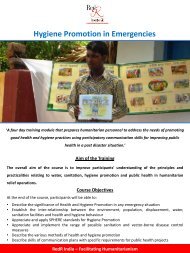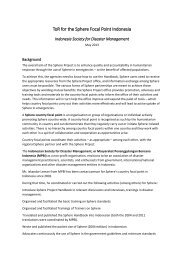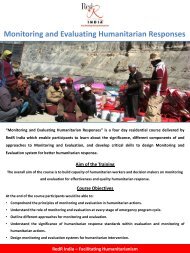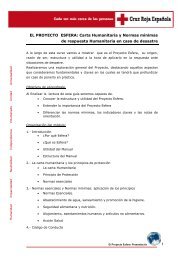Emergency Needs Assessment and Project Planning - The Sphere ...
Emergency Needs Assessment and Project Planning - The Sphere ...
Emergency Needs Assessment and Project Planning - The Sphere ...
You also want an ePaper? Increase the reach of your titles
YUMPU automatically turns print PDFs into web optimized ePapers that Google loves.
<strong>Emergency</strong> <strong>Needs</strong> <strong>Assessment</strong> <strong>and</strong> <strong>Project</strong> <strong>Planning</strong><br />
It is imperative for the disaster response plan, to be grounded in a sound assessment <strong>and</strong> analysis of<br />
the affected population; even if it is a rapid one. Essentially, it should identify the most immediate<br />
problems, needs <strong>and</strong> allocate the resources available to meet those needs. This workshop dwells at<br />
length on the process of collecting <strong>and</strong> analysing information, the specific assessment techniques <strong>and</strong><br />
good practices in the field of needs assessment along with the orientation to project planning.<br />
With rising dem<strong>and</strong> for accountability in the humanitarian sector, particularly with the advent of<br />
st<strong>and</strong>ards like those of the <strong>Sphere</strong> <strong>Project</strong>, <strong>and</strong> humanitarian action being based on the protection of<br />
the rights of affected population, the process of needs assessment assumes paramount importance.<br />
Hence the prerequisite is that, time <strong>and</strong> energy needs to be spent judiciously in collecting quality <strong>and</strong><br />
appropriate information, which leads to an objective <strong>Needs</strong> <strong>Assessment</strong> <strong>and</strong> effective <strong>Project</strong><br />
<strong>Planning</strong>.<br />
Aim of the Training<br />
This workshop enhances an individual’s capacity to conduct an emergency needs assessment <strong>and</strong> design<br />
an effective project plan to initiate a successful emergency response.<br />
RedR India – Facilitating Humanitarianism
<strong>Emergency</strong> <strong>Needs</strong> <strong>Assessment</strong> <strong>and</strong> <strong>Project</strong> <strong>Planning</strong><br />
Course Objectives<br />
By the end of the course, participants will be able to:<br />
• Identify an effective approach to conduct the emergency assessments.<br />
• Use assessment frameworks, tools <strong>and</strong> techniques during emergencies.<br />
• Explain underlying principles of emergency assessments.<br />
• Explain the use of <strong>Sphere</strong> <strong>Project</strong> st<strong>and</strong>ards for needs assessment.<br />
• Implement the skills of problem analysis <strong>and</strong> project planning using a log frame.<br />
Course Outline<br />
• Organisation <strong>and</strong> management: objectives of the assessment, TORs, planning assessment activities,<br />
information collation, report writing.<br />
• Analytical frameworks: that determine the focus of the assessments <strong>and</strong> the way assessment<br />
information translates into programme response <strong>and</strong> helps establish indicators for measuring<br />
progress, impact <strong>and</strong> relevance.<br />
• Data collection techniques: how they work, when to use them <strong>and</strong> the meaningfulness of the data<br />
they produce.<br />
RedR India – Facilitating Humanitarianism
<strong>Emergency</strong> <strong>Needs</strong> <strong>Assessment</strong> <strong>and</strong> <strong>Project</strong> <strong>Planning</strong><br />
• Sector-specific issues: data collection methodologies <strong>and</strong> analytical frameworks that is most<br />
appropriate to each sector, links between sectors, <strong>and</strong> benchmarks.<br />
• Integration of the information: collected from needs assessment into problem analysis <strong>and</strong><br />
thereafter planning a sound emergency response.<br />
Expected Participants<br />
This course is ideal for experienced emergency personnel <strong>and</strong>/or who are likely to carry out needs<br />
assessments in their work. Participants already with need assessment experience are particularly<br />
encouraged to apply. A typical profile of a group would include professionals from Government<br />
Officials, UN agencies, Red Cross, INGOs, Local NGOs’ staff involved with emergency preparedness <strong>and</strong><br />
response.<br />
Training Methodology<br />
In the training emphasis is on active learning through participatory group exercises, case studies,<br />
demonstrations, focused discussions, simulations <strong>and</strong> practice with equipment used in the field.<br />
Training is planned <strong>and</strong> presented in collaboration with relief agencies <strong>and</strong> specialist organisations.<br />
Informal exchange of experience is a vital part of every course. Trainers, experienced relief workers <strong>and</strong><br />
technical institutions from India shall be part of the training resource.<br />
RedR India – Facilitating Humanitarianism
<strong>Emergency</strong> <strong>Needs</strong> <strong>Assessment</strong> <strong>and</strong> <strong>Project</strong> <strong>Planning</strong><br />
General Information<br />
This is an intensive five day module<br />
combining theory <strong>and</strong> h<strong>and</strong>s-on practice.<br />
Training shall be conducted English but as a<br />
RedR India policy, participants who are not<br />
very comfortable with English are also<br />
encouraged to participate <strong>and</strong> are helped in<br />
every possible way.<br />
RedR India<br />
"Samrudhi", Bungalow No.1, A Wing, AJ<br />
Classics Condominium, Survey No.2/3A,<br />
Hingne, Karve Nagar, Pune 411052,<br />
Maharashtra, India<br />
Phone: +91-20-25474430,<br />
+91-20-32912532<br />
You can also write to us at: info@redrindia.org<br />
Dates & Venue<br />
17th to 21st July, 2012<br />
Pune, India<br />
Course Fees<br />
• Residential rate*- USD 550<br />
• Non-Residential** rate - USD 300<br />
How to Apply<br />
Please fill out the attached Registration Form <strong>and</strong><br />
send it to training@redrindia.org. On confirmation<br />
of availability of seat please forward your course<br />
fee to RedR India. For more details on course fee<br />
please refer the application form.<br />
For more information about the training <strong>and</strong>/or<br />
RedR India, please visit: www.redr.org.in<br />
*Includes tuition, food <strong>and</strong> accommodation.<br />
**Includes only tuition , lunch <strong>and</strong> refreshments<br />
during training.<br />
*Photo Credit: RedR India<br />
RedR India – Facilitating Humanitarianism


